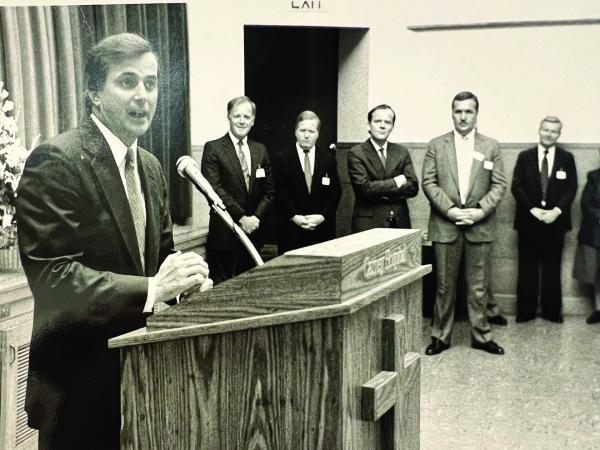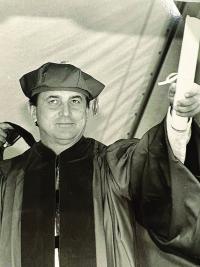March 15, 2023

US Rep. Brian Donnelly spoke during an event held at Dorchester’s Carney Hospital circa 1984.
Reporter file photo

It was with great sadness that I read of the death of former ambassador, congressman, and state representative Brian Donnelly. Brian was a powerhouse congressman (1979-93) who always worked behind the scenes and delivered for Boston.
He also played a major role in my education as the leader of community nonprofit organizations, for which I’ll be forever thankful.
I was involved in the founding of the Massachusetts Nonprofit Network (MNN), the state’s voice for the nonprofit sector. The idea to create such an organization germinated during the recession that followed the 9/11 attacks. The national economy went into a tailspin, which resulted in state cuts to nonprofit human service, healthcare, youth, and development agencies. Though the need for these organizations increases during hard times, then-Gov. Mitt Romney announced that nonprofits could not expect more support because he was going to preserve jobs. He was of the opinion that nonprofit jobs weren’t “real jobs.”
Those of us in the nonprofit sector couldn’t imagine how the governor could neglect all the jobs created by nonprofits. Indeed, the largest employers in urban neighborhoods are often nonprofits. A group of us decided to study the impact of nonprofits and we found that in Boston, Cambridge, and four other close suburbs, the nonprofits were a $2.5 billion sector of the economy, not including hospitals, universities, and museums.
Other regions’ nonprofits also did studies and found that nonprofits made up an enormous part of their economies as well.
The result was the creation of MNN, which is a strong statewide advocacy organization. In the process of forming MNN, however, we found that many nonprofit leaders were apolitical. In fact, many of them believed that they could not lobby politically for support from government (they can), or advocate on a referendum question (they can).
I learned the importance of lobbying government in the mid-1980s via an effort to get federal support for the capital needs of Dorchester nonprofit agencies. Kristen McCormack, who ran Federated Dorchester Neighborhood Houses, and I (the founder of Codman Square Health Center) both had agencies with capital needs that would cost millions of dollars to fix. Kristen talked with the YMCA and Boys and Girls Club, also in need of capital dollars, and we found that all of us were seeking dollars from the same foundations, making it highly unlikely that our needs would be fulfilled.
While looking in a file cabinet, Kristen came upon documents related to the 1974 construction of the Dorchester House Multi-Service Center. She found that the Dorchester House was built with federal funding from a “special purpose grant,” money that is usually is given to organizations represented by congresspeople with power. She requested a meeting with Congressman Joe Moakley of South Boston, who was impressed that Kristen knew that a photo on his wall was of former US House Speaker John McCormack and that there was such a thing as a “special purpose grant.”
He suggested that such a grant was possible and that we should work with Brian Donnelly, who was on the House Ways and Means Committee. We met Brian in Washington, where he had his chief of staff bring out a huge binder that listed programs of the federal government. I remember sitting there with the chief of staff reading out the names of different funding sources, and Brian saying “no” or “not a match” until we got to one that had “community” and “agency” in its title.
Brian asked his chief of staff, “What’s that for?”
“I have no idea,” the chief of staff said.
“Sounds perfect!” Brian said.
We drafted the language with Brian’s staff, and it was attached to a piece of legislation calling for money for four agencies in Dorchester, but not listing our actual names, which is standard for legislation, though, if funded, the four agencies would be the only ones that would qualify for it. From there, the legislation went to the Rules Committee, which was chaired by Joe Moakley.
I don’t remember if our legislation was attached to a Vietnam Memorial for Mississippi, or if we were in competition with the memorial, but Moakley got it through, and our four agencies shared $4 million, a lot of money in those days. Brian Donnelly, as was his way, never took public credit for the funding.
My exposure to this process changed my view of government and political process. First, community nonprofits need government because a large percentage of the people we serve are dependent on government. Second, government can be responsive, but you have to be both knowledgeable of government processes and, frankly, pushy.
In the 1990s, I visited a health center conference in Washington and dropped into Congressman Joe Kennedy’s office (the one who represented Boston). He lectured the health center directors that we were too nice. He said that hospital representatives came into his office with a list of demands, while health center representatives asked him how he was doing.
Nonprofit leaders have a responsibility to shape public policy. Since we deal closely with society’s problems, we need to be seen as the experts on what works and what doesn’t. Participating in the political process is how this can happen. It means being able to make a case for support, educating elected officials on why what you do is important, and, especially, developing strong relationships with elected officials. Thank you, Brian, for teaching me this.


